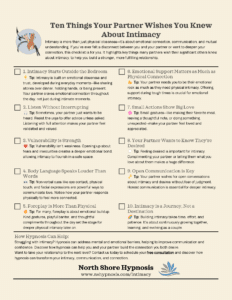
Introduction
Commitment is often seen as a cornerstone of lasting relationships and personal growth. Whether it’s pledging to a partner, choosing a life path, or accepting a job offer, commitment requires trust—both in yourself and in the process. For many, however, fear of commitment stands as a persistent barrier to happiness. This fear doesn’t only impact romantic relationships; it can stifle career aspirations, personal development, and even friendships.
At North Shore Hypnosis, we’ve seen firsthand how fear of commitment can hold people back. We specialize in client-centered hypnosis and intimacy coaching, helping clients address underlying anxieties, build healthier outlooks on relationships, and ultimately stand on a firmer foundation for making life-changing decisions.
In this comprehensive guide, we’ll delve into the roots of commitment phobia, uncover how it manifests, and explore strategies for moving beyond fear—including how hypnosis can be a powerful tool in this journey.
Understanding Fear of Commitment
Fear of commitment often stems from past experiences, cultural pressures, or personal insecurities. Common triggers include:
- Fear of Loss or Rejection: Many people avoid commitment because they fear the potential heartbreak if the relationship or situation doesn’t work out.
- Perfectionism or Fear of Failure: The pressure to “do it right” can make commitment feel overwhelmingly risky.
- Attachment Issues: Early relationship experiences (with parents or caregivers) can shape how we perceive long-term attachments.
- Loss of Independence: Some worry that committing to a relationship means losing their personal freedom or identity.
It’s important to recognize that this fear is a form of anxiety. Just as stress and anxiety can impact other parts of your life, fear of commitment is a specific manifestation of deeper concerns.
Signs You Might Have a Fear of Commitment
You may wonder if you genuinely have a fear of commitment or if your hesitations are simply rational caution. Here are some telltale signs:
- Serial Dating or Avoidance of Long-Term Plans: You move from one short-term relationship to another or avoid discussing the future.
- Over-Focusing on Flaws: You become hyper-aware of a partner’s minor imperfections, using them as reasons to jump ship.
- Anxiety About Labels: Even discussing “boyfriend,” “girlfriend,” or “partner” might make you sweat.
- Self-Sabotage: You might unconsciously undermine promising relationships, perhaps by starting unnecessary arguments or distancing yourself emotionally.
If these behaviors ring a bell, you’re not alone. Many people exhibit some degree of commitment anxiety, and it’s often linked to broader stress responses. Learning more about how stress affects the body might help you see patterns in how your mind and body respond to relationship fears.
The Emotional Toll of Commitment Phobia
While it may start as a small worry, fear of commitment can grow into a significant emotional burden. Here’s how:
- Chronic Stress and Anxiety: The constant worry about the future can lead to ongoing stress that drains your mental energy. Over time, this can affect your immune system, sleep quality, and overall well-being. (Read more about how hypnosis can improve your sleep quality and reduce stress).
- Isolation and Loneliness: Avoiding deep connections can lead to a sense of isolation. Even if you surround yourself with friends, you might still feel disconnected.
- Missed Opportunities: Whether it’s a blossoming romance or a career path, fear of commitment can make you hesitate until the opportunity passes.
- Lower Self-Esteem: Repeatedly second-guessing yourself can chip away at self-confidence, creating a cycle of doubt.
Common Misconceptions
“Fear of commitment means you don’t want love.”
Not necessarily. Many who struggle with commitment actually do crave love and connection. Their anxiety overshadows that desire.
“If I’m afraid to commit, I must not have met ‘the one.’”
This myth can keep people trapped, waiting for a “perfect” person who erases all doubts. In reality, fear of commitment usually requires internal work rather than an external fix.
“People with commitment issues are just selfish.”
Fear of commitment often arises from deep-seated vulnerabilities, not from a lack of caring. Recognizing and addressing these vulnerabilities is key to change.
The Role of Stress and Anxiety in Commitment Fears
Commitment fears often coexist with broader stress and anxiety patterns. When you’re under chronic stress, your brain becomes wired to detect potential threats—even if the threat is simply the vulnerability of entering a serious relationship. By learning to manage stress, you can break free from this negative cycle.
If you recognize you’re carrying a lot of anxiety, you might explore techniques like bilateral stimulation for stress and anxiety. This therapeutic approach works to reduce the intensity of distressing feelings, making it easier to face fears without becoming overwhelmed.
Why Addressing Fear of Commitment Matters
Quality of Life: Feeling safe enough to commit can enrich your relationships, deepen friendships, and even open you up to career opportunities.
Emotional Health: Resolving commitment fears often goes hand-in-hand with increased self-esteem and better stress management.
Personal Growth: Overcoming commitment anxiety can help you develop resilience and a stronger sense of self, which you can carry into every aspect of your life.
How Hypnosis Can Help You Overcome Fear of Commitment
You might be familiar with hypnosis for smoking cessation or weight loss, but did you know it can also be effective for tackling deep-rooted fears and anxieties? At North Shore Hypnosis, we use a client-centered approach, meaning every session is tailored to your unique experiences, triggers, and goals.
- Rewriting Limiting Beliefs: Hypnosis allows you to access your subconscious mind, the place where deep-seated fears often lurk. By gently exploring those beliefs, you can replace them with healthier, more empowering perspectives.
- Building Emotional Resilience: Through guided imagery and positive suggestions, hypnosis can help you feel more grounded, preparing you to handle the emotional peaks and valleys of relationships. (Learn more about hypnosis for stress relief).
- Enhancing Self-Confidence: A large component of commitment anxiety is linked to self-worth. Hypnosis can help bolster your sense of personal value, making you feel deserving of stable, loving relationships.
If you’re curious about how hypnosis can directly address relationship challenges, check out “Improving Intimacy in Relationships with Hypnosis.”
Steps to Conquer Your Fear of Commitment
- Identify Your Triggers
Knowing what sparks your anxiety is the first step in changing your response. Are you scared of repeating past relationship failures? Do you equate commitment with losing personal freedom? Pinpointing the source will help you tackle it more effectively.
- Journaling: Keep a diary of moments when commitment anxiety arises. This practice can reveal recurring patterns or triggers.
- Professional Guidance: A therapist or hypnotherapist can help you dig deeper to uncover subconscious triggers.
- Practice Mindful Awareness
Next, practice staying present with your emotions. When you feel anxious about the future, pause and ask yourself what’s really happening in the now. Often, your fear is fueled by hypotheticals rather than actual events.
- Meditation and Relaxation Techniques: Simple breathing exercises can reduce anxiety, as can progressive muscle relaxation.
- Guided Hypnosis Sessions: A structured hypnosis session helps you observe your anxious thoughts from a calmer state.
- Challenge Negative Self-Talk
Fear of commitment often comes with a harsh inner critic that amplifies the “what ifs.” Challenge statements like “I’m just bad at relationships” or “I always mess things up.” Replace them with affirmations: “I’m capable of growth,” “I can learn from my past.”
- Cognitive Restructuring: This involves catching negative thoughts and actively reframing them in a more realistic or positive way.
- Affirmations: Recite empowering statements daily, such as “I am worthy of love and stability.”
- Set Healthy Boundaries
Healthy boundaries are essential for feeling safe enough to commit. When you’re worried about losing yourself in a relationship, remember that you define how much alone time or personal space you need. Communicate these boundaries clearly to your partner.
- Open Dialogue: Talk to your partner or potential partner about your fears in a calm, honest way.
- Seek Support: If setting boundaries feels unnatural, a counselor or coach can offer tips. (Read “Enhancing Communication in Intimate Relationships with Hypnosis” for more insights.)
- Take Incremental Steps
Change doesn’t happen overnight. Start by committing to smaller things—a weekend trip with your partner, a volunteer project, or finishing a short online course. Achieving these smaller commitments builds self-trust and confidence.
- Celebrate Milestones: Recognize each step forward, no matter how small.
- Reflect on Progress: Keep track of your successes in a journal or with a mental check-in.
Supporting Strategies
- Physical Wellness: Good health and restful sleep can make you more resilient to stress. If you’re struggling with sleep, read our post on “How Hypnosis Can Help with Sleep Issues Related to Stress.”
- Stress Management Techniques: Exercise, balanced nutrition, and mindfulness activities like yoga can stabilize your mood. For tips on reducing daily stress, explore “10 Surprising Ways Hypnosis Reduces Everyday Stress.”
- Addressing Past Trauma: If past relationships or childhood experiences contribute to your fear, professional help can guide you to heal. Hypnosis can be a gentle, effective tool for unpacking and resolving trauma-related anxiety. (See “Understanding Anxiety: How Hypnosis Addresses Root Causes.”)
- Building Intimacy Skills: Because fear of commitment is closely tied to intimacy, you may benefit from techniques that enhance connection with a partner. Read “Using Hypnosis to Enhance Intimacy and Strengthen Relationships.” for practical insights.
When to Seek Professional Help
While self-help strategies can provide some relief, ongoing fear of commitment that interferes with your happiness, career, or relationships often calls for professional intervention. A qualified hypnotist can help you:
- Uncover and heal subconscious beliefs
- Develop coping strategies tailored to your situation
- Navigate relationship dynamics more confidently
If your fear of commitment intertwines with deeper intimacy or sexual concerns, consider reading our post on “Improving Intimacy in Relationships with Hypnosis.” You’ll find practical steps to break the cycle of anxiety and create a healthier, more connected partnership.
Final Thoughts
Confronting the fear of commitment can feel daunting, but it’s a transformative step toward happier, healthier relationships—both with others and yourself. By understanding your triggers, practicing mindful awareness, and exploring powerful tools like hypnosis, you can dismantle the barriers that keep you stuck. You don’t need to navigate this journey alone. Professional support from experienced practitioners—such as those at North Shore Hypnosis—offers a guiding hand, helping you move from apprehension to self-assuredness.
Take that first step. Free yourself from the constraints of fear and discover the peace that comes with standing tall in your decisions. After all, you deserve a life filled with love, growth, and meaningful commitment.
Learn Ten Things Your Partner Wishes You Knew About Intimacy

Do you want to have better intimate relationships? Discover ten things your partner wants you to know to have more fulfilling relationships.
Click now for your free checklist, “Ten Things Your Partner Wishes You Knew About Intimacy.

